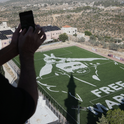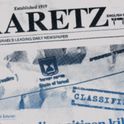In a famous mystery by the mysterious Cameron McCabe, The Face on the Cutting Room Floor, the plot revolves around a murder which arises from the excision of an actress from a movie. Such things are not unknown in reality; co-stars are not encouraged to outshine their superiors. The reasons for cutting lumps out of documentary films are different, as I have learned while making For God's Sake for Channel Four. It was, however, instructive to discover what did and did not make the final cut.
Our subject was the divinity, or divinities, whom men and women have chosen to worship. Who is more credulous than an agnostic in search of religious knowledge? I feared and expected a Significant Encounter. I had, for example, never before been to Israel, God's last known address. I approached the land of my putative fathers with apprehension. What had happened to Saul on the road to Damascus might occur, on camera, to me on the road to Jerusalem. Mutatis mutandis, I might be converted from secular Diasporite to Chassidic Zionist. There are similar capers in the Bible, are there not? Alternatively, I might provoke a local angel and-more than likely-prove unable to wrestle even a lame Jacobean draw with him. But there is no excised scene on the cutting room floor in which I speak with tongues or discover the truth of orthodox Judaism, or convert to Islam in the Dome of the Rock.
u u u
in truth, there was little in Israel to change the wandering, secular Jew's mind. What was cut from the film was not any embarrassing revelation but only, as usual, what lacked visual appeal or emblematic trenchancy. Thus (and I do not argue with the excision) nothing remains of a long interview, on the Knesset lawn, with Chaim Ramon, one of the losing challengers for the leadership of the Labour party after the defenestration of Shimon Peres. With admirable lack of bile, Chaim regretted, but not bitterly, the policies of Bibi Netanyahu, not because they were those of the Likud but because they were incoherent.
Netanyahu is, of course, a prisoner of the religious parties. The comedy, such as it is, is that the orthodox rabbis have the power they do thanks to a system of proportional representation wished upon the country by founders who assumed that Israel would be a secular state in which Kabalistic obscurantism would have no place.
Chaim Ramon was optimistically pessimistic. He thought that the present government would cause a lot more bloodshed but that, eventually, the peace process would resume. It was not a matter of God being in his heaven, but of chaos, bereavement and bankruptcy being the only alternative. The futile disingenuousness of Netanyahu's policies was underlined when I was taken to Har Homa, the building site, as Robin Cook noisily found out for himself, symbolising Israeli intrusion on Arab land in east Jerusalem. My guide was a sabra who had fought in both the 1967 and the 1973 war. With calm desperation, he surveyed the bleakly untenanted hillside, which Palestinian workers were gouging with giant diggers, and observed that if Bibi could call this "Jerusalem," he might as well say the same of Bethlehem, which was just over the hill.
That neither of these conversations appeared in the final film is due not to Zionist pressure, but the pitiless rule that allows no time for small, sad truths. Another omission, for a different reason, came as a result of the need to change magazines on the camera during an interview with the Imam of Jericho. The Imam, who seemed unnervingly like George Steiner, was amiably dismayed by the rupture of his melodious discourse and, when invited to begin again where he had left off, abandoned the language of the faithful to say, "Sonofabitch, gimme a break!" The Imam had for 20 years been a car salesman in the US.
u u u
i had a moment of glory on Mount Sinai, which we mounted on camels at 3am, in order to capture that (trite?) shot of The Presenter gloriously enlightened by the rising sun. It appears that I am alone with my God, but what the viewer cannot see is the crowd of tourists who had preceded us up the mountain and whose off-camera clamour threatened to fill the soundtrack. Our delightful production manager was too nice to make a silencing impression on 300 or 400 Italians as they started down the hill to breakfast. Meanwhile, the sun was inching upwards. I decided on desperate measures and, from my crag, spoke thus unto them: "Italiani! Gente di un gran paese del cinema, racciamo un film. Nel home di Michelangelo Antonioni e Federico Fellini, SILENZIO PREGO! Si gira!"
The silence allowed me to speak with a still small voice and seem utterly alone. Never before have I felt the exhilaration of mastering a crowd. It was my petty finest hour. My Italian was not impeccable, but it was uttered under pressure, unlike the French of that notably tart polymath AN Wilson who, in a recent slice of his Standard stuff, attributed to Napoleon the words (supposedly delivered to Josephine) "Ne lave-toi, je viens." (sic, and ye shall find). In fact the emperor is supposed to have said: "Ne te lave pas, j'arrive." In the world of literary arrivistes, the solecism also rises.











